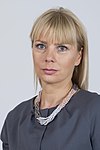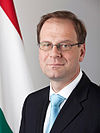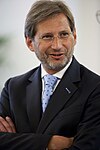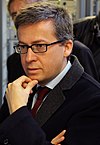European People's Party
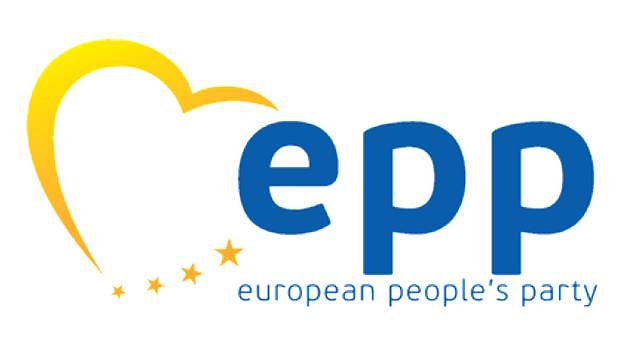
European People's Party

European People's Party | |
|---|---|
| President | Joseph Daul (FR) |
| Group leader | Manfred Weber MEP (DE) |
| Secretary-General | Antonio López-Istúriz White MEP (ES) |
| Founded | 8 July 1976 (1976-07-08) |
| Headquarters | Rue du Commerce/Handelsstraat 10, 1000 — Brussels, Belgium |
| Think tank | Wilfried Martens Centre for European Studies |
| Student wing | European Democrat Students |
| Youth wing | Youth of the European People's Party |
| Women's wing | Women of the European People's Party |
| Ideology | Conservatism[2] Liberal conservatism[3] Christian democracy[3] Pro-Europeanism[4] |
| Political position | Centre-right[2] |
| International affiliation | Centrist Democrat International,[5] International Democrat Union[6] |
| European Parliament group | European People's Party |
| Colours | Blue |
| European Parliament | 182 / 751 |
| European Council | 9 / 28 |
| European Lower Houses | 2,199 / 9,874 |
| European Upper Houses | 569 / 2,714 |
| Website | |
| www.epp.eu [51] | |
| |
The European People's Party (EPP) is a European political party with conservative[7] and liberal-conservative[3] member parties. A transnational organisation, it is composed of other political parties, not individuals. Founded by primarily Christian democratic parties in 1976, it has since broadened its membership to include liberal-conservative parties and parties with other centre-right political perspectives.[8][9][10][11]
The EPP has been the largest party in the European Parliament since 1999 and in the European Council since 2002. It is also by far the largest party in the current European Commission. The President of the European Council, President of the European Commission and the President of the European Parliament are all from the EPP. Many of the Founding fathers of the European Union were also from parties that later formed the EPP. Outside the EU the party also controls a majority in the Parliamentary Assembly of the Council of Europe. The EPP has alternated with its centre-left rival the Party of European Socialists (PES) as the largest European political party and parliamentary group.
The EPP includes major centre-right parties such as the CDU/CSU of Germany, The Republicans of France, CD&V of Belgium, KDU-ČSL of the Czech Republic, Fine Gael of Ireland, New Democracy of Greece, Forza Italia of Italy, the People's Party (PP) of Spain, the Social Democratic Party of Portugal, the Civic Platform of Poland, and Fidesz of Hungary.
European People's Party | |
|---|---|
| President | Joseph Daul (FR) |
| Group leader | Manfred Weber MEP (DE) |
| Secretary-General | Antonio López-Istúriz White MEP (ES) |
| Founded | 8 July 1976 (1976-07-08) |
| Headquarters | Rue du Commerce/Handelsstraat 10, 1000 — Brussels, Belgium |
| Think tank | Wilfried Martens Centre for European Studies |
| Student wing | European Democrat Students |
| Youth wing | Youth of the European People's Party |
| Women's wing | Women of the European People's Party |
| Ideology | Conservatism[2] Liberal conservatism[3] Christian democracy[3] Pro-Europeanism[4] |
| Political position | Centre-right[2] |
| International affiliation | Centrist Democrat International,[5] International Democrat Union[6] |
| European Parliament group | European People's Party |
| Colours | Blue |
| European Parliament | 182 / 751 |
| European Council | 9 / 28 |
| European Lower Houses | 2,199 / 9,874 |
| European Upper Houses | 569 / 2,714 |
| Website | |
| www.epp.eu [51] | |
| |
History

Logo of European People's Party from 1999 to 2015
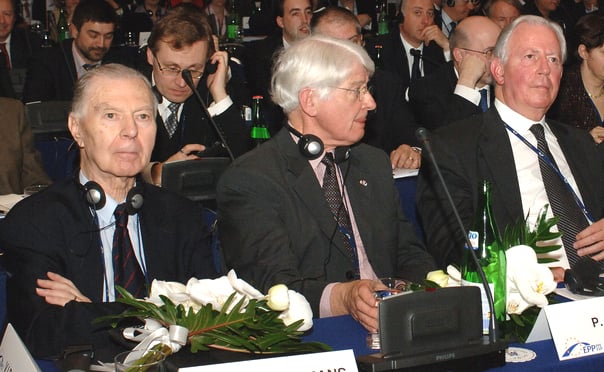
From left to right:Tindemans, Bukman and Santer; former presidents of the EPP
According to its website, the EPP is "the family of the political centre-right, whose roots run deep in the history and civilisation of the European continent, and [which] has pioneered the European project from its inception".[12]
The EPP was founded in Luxembourg on 8 July 1976 on the initiative of Jean Seitlinger; Leo Tindemans, then Prime Minister of Belgium, who became the first President of the EPP; and Wilfried Martens, who later became both President of the EPP and Prime Minister of Belgium. It had been preceded by the Secretariat International des partis démocratiques d'inspiration chrétienne, founded in 1925,[13] the Nouvelles Equipes Internationales, founded in 1946[14] (or 1948),[13] and the European Union of Christian Democrats, founded in 1965.[14]
In the late 1990s the Finnish politician Sauli Niinistö negotiated the merger of the European Democrat Union (EDU), of which he was President, into the EPP. In October 2002 the EDU ceased its activities after being formally absorbed by the EPP at a special event in Estoril, Portugal. In recognition of his efforts Niinistö was elected Honorary President of the EPP the same year.
The EPP has had five Presidents:
| No. | Image | Name | Tenure | Member state |
|---|---|---|---|---|
| 1 |  | Leo Tindemans | 1976–1985 | |
| 2 |  | Piet Bukman | 1985–1987 | |
| 3 |  | Jacques Santer | 1987–1990 | |
| 4 |  | Wilfried Martens | 1990–2013 | |
| 5 |  | Joseph Daul | 2013–present |
Platform and manifesto
Political manifesto and platform
During its Congress in Bucharest in 2012 the EPP updated its political platform after 20 years (since its Congress in Athens in 1992) and approved a political manifesto in which it summarised its main values and policies.
The manifesto highlights:
Freedom as a central human right, coupled with responsibility
Respect for traditions and associations
Solidarity to help those in need, who in turn should also make an effort to improve their situation
Ensuring solid public finances
Preserving a healthy environment
Subsidiarity
Pluralist democracy and a Social Market Economy
The manifesto also describes the EPP's priorities for the EU, including:
European Political Union
Direct election of the President of the European Commission
Completion of the European Single Market
Promotion of the family, improvements in education and health
Strengthening of the common immigration and asylum policy, and integrating immigrants
Continuation of enlargement of the EU, enhancement of the European Neighbourhood Policy and special relationship frameworks for countries that cannot, or do not want to, join the EU
Defining a true common EU energy policy
Strengthening European political parties
Electoral manifesto
As a central part of its campaign for the European elections in 2009 the EPP approved its election manifesto at its Congress in Warsaw in April that year. The manifesto called for:
Creation of new jobs, continuing reforms and investment in education, lifelong learning, and employment in order to create opportunities for everyone.
Avoidance of protectionism, and coordination of fiscal and monetary policies.
Increased transparency and surveillance in financial markets.
Making Europe the market leader in green technology.
Increasing the share of renewable energy to at least 20 per cent of the energy mix by 2020.;.
Family-friendly flexibility for working parents, better child care and housing, family-friendly fiscal policies, encouragement of parental leave.
A new strategy to attract skilled workers from the rest of the world to make Europe’s economy more competitive, more dynamic and more knowledge-driven.
The Fidesz-crisis
Controversy over the right-wing politics of the Hungarian Fidesz-leader Viktor Orbán caused a split in the EPP in the run-up of the 2019 European Parliament election.[15] On the one hand the EPP had been reluctant for years to address Fidesz's stance against the rule of law, expressed by the Article 7 proceedings of the European Parliament. On the other hand European Commission President Jean-Claude Juncker, a prominent EPP-member, stated “I believe his [Fidesz’s] place is not in the European People’s Party”.[16] Orbán’s campaigns targeting billionaire George Soros[17] and Jean-Claude Juncker[18] carried wide reverberations for Europe questioning the EPP’s effort to install its lead candidate Manfred Weber as the next Commission president.[19]
After years of deferring a decision about the Fidesz issue,[20] the EPP was eventually compelled to address the problem two months before the 2019 European elections, as 13 outraged member parties requested the Hungarian party's exclusion from the EPP due to its billboard campaign featuring Jean-Claude Juncker. 190 of the 193 EPP delegates decided on 20 March 2019 to partially suspend Fidesz membership. According to this, Fidesz is "until further notice" excluded from EPP meetings and internal elections, but remains in the European People's Party group of the European Parliament. Fidesz has not delivered on its earlier promise to leave the EPP in case of a penalty.[21]
Governance
The EPP operates as an international non-profit association under Belgian law according to its by-laws, the Statutes of the European People's Party (Statuts du Parti Populaire Européen), originally adopted 29 April 1976.
Presidency
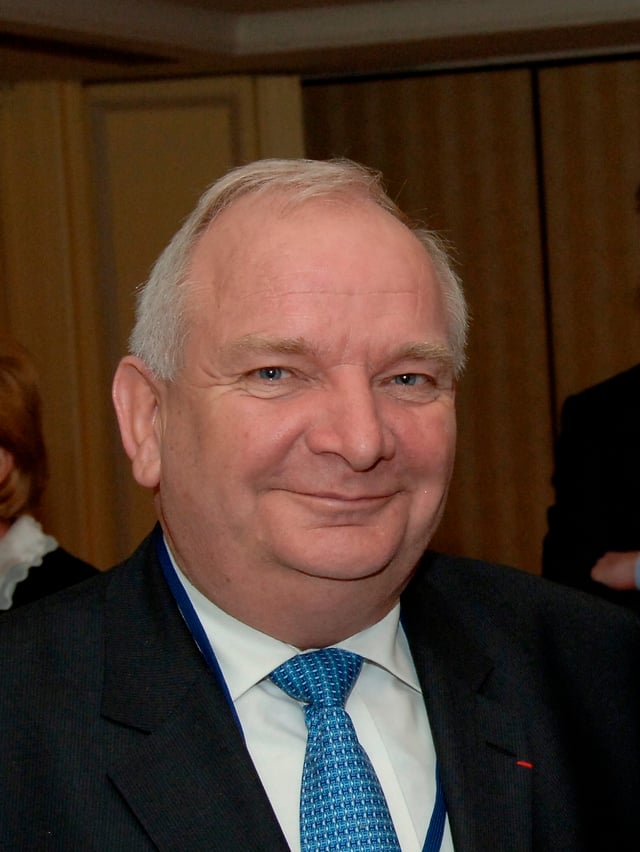
President of the EPP Joseph Daul
The Presidency is the executive body of the party. It decides on the general political guidelines of the EPP and presides over its Political Assembly. The Presidency is composed of the President, ten Vice-Presidents, the Honorary Presidents, the Secretary General and the Treasurer. The Chairperson of the EPP Group in the European Parliament, the Presidents of the Commission, the Parliament and the Council, and the High Representative (if they are a member of an EPP member party) are all ex officio Vice-Presidents.
As of 2015 the Presidency[22] of the EPP comprised:
[[INLINE_IMAGE|//upload.wikimedia.org/wikipedia/en/thumb/c/c3/Flag_of_France.svg/23px-Flag_of_France.svg.png|//upload.wikimedia.org/wikipedia/en/thumb/c/c3/Flag_of_France.svg/35px-Flag_of_France.svg.png 1.5x, //upload.wikimedia.org/wikipedia/en/thumb/c/c3/Flag_of_France.svg/45px-Flag_of_France.svg.png 2x|France|h15|w23|thumbborder flagicon-img flagicon-img]] Joseph Daul – President
[[INLINE_IMAGE|//upload.wikimedia.org/wikipedia/en/thumb/9/9a/Flag_of_Spain.svg/23px-Flag_of_Spain.svg.png|//upload.wikimedia.org/wikipedia/en/thumb/9/9a/Flag_of_Spain.svg/35px-Flag_of_Spain.svg.png 1.5x, //upload.wikimedia.org/wikipedia/en/thumb/9/9a/Flag_of_Spain.svg/45px-Flag_of_Spain.svg.png 2x|Spain|h15|w23|thumbborder flagicon-img flagicon-img]] Antonio Lopez-Isturiz White – Secretary General
[[INLINE_IMAGE|//upload.wikimedia.org/wikipedia/en/thumb/b/ba/Flag_of_Germany.svg/23px-Flag_of_Germany.svg.png|//upload.wikimedia.org/wikipedia/en/thumb/b/ba/Flag_of_Germany.svg/35px-Flag_of_Germany.svg.png 1.5x, //upload.wikimedia.org/wikipedia/en/thumb/b/ba/Flag_of_Germany.svg/46px-Flag_of_Germany.svg.png 2x|Germany|h14|w23|thumbborder flagicon-img flagicon-img]] Christian Schmidt – Treasurer
[[INLINE_IMAGE|//upload.wikimedia.org/wikipedia/en/thumb/b/ba/Flag_of_Germany.svg/23px-Flag_of_Germany.svg.png|//upload.wikimedia.org/wikipedia/en/thumb/b/ba/Flag_of_Germany.svg/35px-Flag_of_Germany.svg.png 1.5x, //upload.wikimedia.org/wikipedia/en/thumb/b/ba/Flag_of_Germany.svg/46px-Flag_of_Germany.svg.png 2x|Germany|h14|w23|thumbborder flagicon-img flagicon-img]] David McAllister – Vice-President
[[INLINE_IMAGE|//upload.wikimedia.org/wikipedia/commons/thumb/4/41/Flag_of_Austria.svg/23px-Flag_of_Austria.svg.png|//upload.wikimedia.org/wikipedia/commons/thumb/4/41/Flag_of_Austria.svg/35px-Flag_of_Austria.svg.png 1.5x, //upload.wikimedia.org/wikipedia/commons/thumb/4/41/Flag_of_Austria.svg/45px-Flag_of_Austria.svg.png 2x|Austria|h15|w23|thumbborder flagicon-img flagicon-img]] Johannes Hahn – Vice-President
[[INLINE_IMAGE|//upload.wikimedia.org/wikipedia/commons/thumb/b/bc/Flag_of_Finland.svg/23px-Flag_of_Finland.svg.png|//upload.wikimedia.org/wikipedia/commons/thumb/b/bc/Flag_of_Finland.svg/35px-Flag_of_Finland.svg.png 1.5x, //upload.wikimedia.org/wikipedia/commons/thumb/b/bc/Flag_of_Finland.svg/46px-Flag_of_Finland.svg.png 2x|Finland|h14|w23|thumbborder flagicon-img flagicon-img]] Jyrki Katainen - Vice-President
[[INLINE_IMAGE|//upload.wikimedia.org/wikipedia/en/thumb/0/03/Flag_of_Italy.svg/23px-Flag_of_Italy.svg.png|//upload.wikimedia.org/wikipedia/en/thumb/0/03/Flag_of_Italy.svg/35px-Flag_of_Italy.svg.png 1.5x, //upload.wikimedia.org/wikipedia/en/thumb/0/03/Flag_of_Italy.svg/45px-Flag_of_Italy.svg.png 2x|Italy|h15|w23|thumbborder flagicon-img flagicon-img]] Antonio Tajani – Vice-President
[[INLINE_IMAGE|//upload.wikimedia.org/wikipedia/commons/thumb/9/92/Flag_of_Belgium_%28civil%29.svg/23px-Flag_of_Belgium_%28civil%29.svg.png|//upload.wikimedia.org/wikipedia/commons/thumb/9/92/Flag_of_Belgium_%28civil%29.svg/35px-Flag_of_Belgium_%28civil%29.svg.png 1.5x, //upload.wikimedia.org/wikipedia/commons/thumb/9/92/Flag_of_Belgium_%28civil%29.svg/45px-Flag_of_Belgium_%28civil%29.svg.png 2x|Belgium|h15|w23|thumbborder flagicon-img flagicon-img]] Marianne Thyssen– Vice-President
[[INLINE_IMAGE|//upload.wikimedia.org/wikipedia/en/thumb/1/12/Flag_of_Poland.svg/23px-Flag_of_Poland.svg.png|//upload.wikimedia.org/wikipedia/en/thumb/1/12/Flag_of_Poland.svg/35px-Flag_of_Poland.svg.png 1.5x, //upload.wikimedia.org/wikipedia/en/thumb/1/12/Flag_of_Poland.svg/46px-Flag_of_Poland.svg.png 2x|Poland|h14|w23|thumbborder flagicon-img flagicon-img]] Rafał Trzaskowski – Vice-President
[[INLINE_IMAGE|//upload.wikimedia.org/wikipedia/commons/thumb/c/c1/Flag_of_Hungary.svg/23px-Flag_of_Hungary.svg.png|//upload.wikimedia.org/wikipedia/commons/thumb/c/c1/Flag_of_Hungary.svg/35px-Flag_of_Hungary.svg.png 1.5x, //upload.wikimedia.org/wikipedia/commons/thumb/c/c1/Flag_of_Hungary.svg/46px-Flag_of_Hungary.svg.png 2x|Hungary|h12|w23|thumbborder flagicon-img flagicon-img]] Kinga Gál – Vice-President
[[INLINE_IMAGE|//upload.wikimedia.org/wikipedia/commons/thumb/4/45/Flag_of_Ireland.svg/23px-Flag_of_Ireland.svg.png|//upload.wikimedia.org/wikipedia/commons/thumb/4/45/Flag_of_Ireland.svg/35px-Flag_of_Ireland.svg.png 1.5x, //upload.wikimedia.org/wikipedia/commons/thumb/4/45/Flag_of_Ireland.svg/46px-Flag_of_Ireland.svg.png 2x|Republic of Ireland|h12|w23|thumbborder flagicon-img flagicon-img]] Dara Murphy – Vice-President
[[INLINE_IMAGE|//upload.wikimedia.org/wikipedia/commons/thumb/5/5c/Flag_of_Portugal.svg/23px-Flag_of_Portugal.svg.png|//upload.wikimedia.org/wikipedia/commons/thumb/5/5c/Flag_of_Portugal.svg/35px-Flag_of_Portugal.svg.png 1.5x, //upload.wikimedia.org/wikipedia/commons/thumb/5/5c/Flag_of_Portugal.svg/45px-Flag_of_Portugal.svg.png 2x|Portugal|h15|w23|thumbborder flagicon-img flagicon-img]] Paulo Rangel – Vice-President
[[INLINE_IMAGE|//upload.wikimedia.org/wikipedia/commons/thumb/2/20/Flag_of_the_Netherlands.svg/23px-Flag_of_the_Netherlands.svg.png|//upload.wikimedia.org/wikipedia/commons/thumb/2/20/Flag_of_the_Netherlands.svg/35px-Flag_of_the_Netherlands.svg.png 1.5x, //upload.wikimedia.org/wikipedia/commons/thumb/2/20/Flag_of_the_Netherlands.svg/45px-Flag_of_the_Netherlands.svg.png 2x|Netherlands|h15|w23|thumbborder flagicon-img flagicon-img]] Corien Wortmann-Kool – Vice-President
[[INLINE_IMAGE|//upload.wikimedia.org/wikipedia/commons/thumb/d/da/Flag_of_Luxembourg.svg/23px-Flag_of_Luxembourg.svg.png|//upload.wikimedia.org/wikipedia/commons/thumb/d/da/Flag_of_Luxembourg.svg/35px-Flag_of_Luxembourg.svg.png 1.5x, //upload.wikimedia.org/wikipedia/commons/thumb/d/da/Flag_of_Luxembourg.svg/46px-Flag_of_Luxembourg.svg.png 2x|Luxembourg|h14|w23|thumbborder flagicon-img flagicon-img]] Jean-Claude Juncker – Ex officio Vice-President (President of European Commission)
[[INLINE_IMAGE|//upload.wikimedia.org/wikipedia/en/thumb/1/12/Flag_of_Poland.svg/23px-Flag_of_Poland.svg.png|//upload.wikimedia.org/wikipedia/en/thumb/1/12/Flag_of_Poland.svg/35px-Flag_of_Poland.svg.png 1.5x, //upload.wikimedia.org/wikipedia/en/thumb/1/12/Flag_of_Poland.svg/46px-Flag_of_Poland.svg.png 2x|Poland|h14|w23|thumbborder flagicon-img flagicon-img]] Donald Tusk – Ex officio Vice-President (President of the European Council)
[[INLINE_IMAGE|//upload.wikimedia.org/wikipedia/en/thumb/b/ba/Flag_of_Germany.svg/23px-Flag_of_Germany.svg.png|//upload.wikimedia.org/wikipedia/en/thumb/b/ba/Flag_of_Germany.svg/35px-Flag_of_Germany.svg.png 1.5x, //upload.wikimedia.org/wikipedia/en/thumb/b/ba/Flag_of_Germany.svg/46px-Flag_of_Germany.svg.png 2x|Germany|h14|w23|thumbborder flagicon-img flagicon-img]] Manfred Weber – Ex officio Vice-President (Chairperson of the EPP Group in European Parliament)
[[INLINE_IMAGE|//upload.wikimedia.org/wikipedia/commons/thumb/b/bc/Flag_of_Finland.svg/23px-Flag_of_Finland.svg.png|//upload.wikimedia.org/wikipedia/commons/thumb/b/bc/Flag_of_Finland.svg/35px-Flag_of_Finland.svg.png 1.5x, //upload.wikimedia.org/wikipedia/commons/thumb/b/bc/Flag_of_Finland.svg/46px-Flag_of_Finland.svg.png 2x|Finland|h14|w23|thumbborder flagicon-img flagicon-img]] Sauli Niinistö - Honorary President
Political Assembly
The Political Assembly defines the political positions of the EPP between Congresses, and decides on membership applications, political guidelines and the budget. The Political Assembly is composed of designated delegates from EPP member parties, associated parties, member associations and other affiliated groups. The Political Assembly meets at least three times a year.
Congress
The Congress is the highest decision-making body of the EPP. It is composed of delegates from member parties, EPP associations, EPP Group MEPs, the EPP Presidency, national heads of party and government, and European Commissioners who belong to a member party, with the numbers of delegates being weighted according to the EPP's share of MEPs, and individual delegates being elected by member parties according to member parties' rules.[23]
Under the EPP's statutes the Congress must meet once every three years, but it also meets normally during the years of elections for the European Parliament (every five years), and extraordinary Congresses have also been summoned. The Congress elects the EPP Presidency every three years, decides on the main policy documents and electoral programmes, and provides a platform for the EPP's heads of government and party leaders.
Activities within the party
Summit
EPP leaders meet for the EPP Summit a few hours before each meeting of the European Council in order to formulate common positions. Invitations are sent by the EPP President and attendees include, besides the members of the EPP's Presidency, all Presidents and Prime Ministers who are members of the European Council and belong to the EPP; the Presidents of the European Parliament, the European Commission and the European Council, as well as the High Representative for Foreign Affairs, provided that they belong to the EPP; Deputy Prime Ministers or other ministers in those cases where the Prime Minister of a country does not belong to an EPP member party; and, where no EPP member party is part of a government, the leaders of the main EPP opposition party.
Ministerial meetings
Following the pattern of the EPP Summit the party also organises regular EPP Ministerial meetings before each meeting of the Council of the European Union, with ministers, deputy ministers, secretaries of state and MEPs in the specific policy field attending:
General Affairs
Foreign Affairs
Economy and Finance
Home Affairs
Justice
Defence
Employment and Social Affairs
Industry
Agriculture
Energy
Environment[24]
Other activities
The EPP also organises working groups on different issues and on an ad hoc basis, as well as meetings with its affiliated members in the European Commission. It also invites individual Commissioners to the EPP Summit meetings and to EPP Ministerial meetings.
Following amendments to the EU Regulation that governs Europarties in 2007, the EPP, like the other "Europarties", is responsible for organising a pan-European campaign for the European elections every five years. According to the Lisbon Treaty, the parties must present candidates for President of the European Commission, but the EPP had already done this by endorsing Jose Manuel Barroso for a second term in April 2009.
The year 2014 saw the first fully fledged campaign of the EPP ahead of the European elections of that year. The party nominated former Luxembourgish Prime Minister Jean-Claude Juncker as its candidate for President of the European Commission and led a pan-European campaign in coordination with the national campaigns of all its member parties.
Activities within European institutions
The EPP holds the Presidencies of two of the three main EU institutions: the European Commission, led by President Jean-Claude Juncker (CSV), and the European Council, led by Donald Tusk (PO), who has been nominated by the EPP and took office 1 December 2014.
Overview of the European institutions
| Organisation | Institution | Number of seats |
|---|---|---|
| European Parliament | 172 / 751 | |
| Committee of the Regions | 125 / 350 | |
| European Commission | 14 / 28 | |
| European Council (Heads of Government) | 9 / 28 | |
| Council of the European Union (Participation in Government) | 12 / 28 |
European Commission
In 2014 the EPP nominated Jean-Claude Juncker as its candidate for election as President of the European Commission. As the EPP won the 2014 European Parliament election, Juncker's nomination was endorsed by the European Council and he was elected by an absolute majority in the European Parliament. On 1 November 2014 the Juncker Commission officially took office. It includes 14 EPP officeholders out of 28 European Commissioners.
European Parliament
The EPP has the largest group in the European Parliament: the EPP Group. As of 2015 it has 216 Members of the European Parliament and its chairman is the German MEP Manfred Weber.
In every election for the European Parliament candidates elected on lists of member parties of the EPP are obliged to join the EPP Group in the European Parliament.
The EPP Group holds six of the fourteen vice-presidencies of the European Parliament.
European Council
The EPP has 8 out of the 28 heads of state or government attending the EPP summits in preparation for the European Council (as of 1 July 2018):
| Member state | Representative | Title | Political party | Member of the Council since | Portrait |
|---|---|---|---|---|---|
| Boyko Borissov | Prime Minister | GERB | 7 November 2014 |  | |
| Andrej Plenković | Prime Minister | HDZ | 19 October 2016 |  | |
| Nicos Anastasiades | President | DISY | 28 February 2013 |  | |
| Angela Merkel | Chancellor | CDU | 22 November 2005 |  | |
| Viktor Orbán | Prime Minister | Fidesz | 29 May 2010 |  | |
| Leo Varadkar | Taoiseach[1] | Fine Gael | 22 June 2017 |  | |
| Klaus Iohannis | President | PNL | 21 December 2014 |  |
The EPP also has other heads of state or government who do not normally take part in the European Council or EPP summits since that responsibility belongs to the other leaders of their countries: János Áder (Hungary, Fidesz), Sauli Niinistö (Finland, KOK).
National legislatures
| Country | Institution | Number of seats |
|---|---|---|
| National Council Lower house | 50 / 183 | |
| Federal Council Upper house | 22 / 62 | |
| Chamber of Representatives Lower house | 27 / 150 | |
| Senate Upper house | 12 / 60 | |
| National Assembly | 95 / 240 | |
| Sabor | 55 / 151 | |
| House of Representatives | 18 / 56 | |
| Chamber of Deputies Lower house | 23 / 200 | |
| Senate Upper house | 34 / 81 | |
| The Folketing | 6 / 179 | |
| Riigikogu | 12 / 101 | |
| Parliament | 38 / 200 | |
| National Assembly Lower house | 100 / 577 | |
| Senate Upper house | 142 / 348 | |
| Bundestag | 310 / 630 | |
| Parliament | 158 / 300 | |
| Országgyűlés | 133 / 199 | |
| Dáil Lower house | 50 / 166 | |
| Seanad Upper house | 19 / 60 | |
| Chamber of Deputies Lower house | 106 / 630 | |
| Senate Upper house | 65 / 315 | |
| Saeima | 8 / 100 | |
| Seimas | 31 / 141 | |
| Chamber of Deputies | 23 / 60 | |
| House of Representatives | 28 / 69 | |
| House of Representatives Lower house | 19 / 150 | |
| Senate Upper house | 12 / 75 | |
| Sejm Lower house | 152 / 460 | |
| Senate Upper house | 33 / 100 | |
| Assembly of the Republic | 107 / 230 | |
| Chamber of Deputies Lower house | 108 / 329 | |
| Senate Upper house | 47 / 136 | |
| National Council | 11 / 150 | |
| National Assembly | 25 / 90 | |
| Congress of Deputies Lower house | 66 / 350 | |
| Senate Upper house | 74 / 266 | |
| Riksdag | 92 / 349 | |
| House of Commons Lower house | 0 / 650 | |
| House of Lords Upper house | 0 / 793 |
Activities beyond the European Union
In third countries
Through its associate and observer parties the EPP has one head of state or government in non-EU countries:
| State | Representatives | Title | Political party | In power since | Portrait |
|---|---|---|---|---|---|
| Erna Solberg | Prime Minister | Høyre | 16 October 2013 |  | |
| Šefik Džaferović | Bosniak Member of the Presidency | SDA | 20 November 2018 |  | |
| Maia Sandu | Prime Minister | PAS | 8 June 2019 | 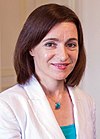 |
The EPP also has other heads of state or government who do not normally attend the meetings, since the other leaders of their countries attend instead. They include Prime Minister Denis Zvizdić (Bosnia-Herzegovina, SDA) and President Gjorge Ivanov (Republic of North Macedonia, VMRO-DPMNE).
In the Council of Europe
The Group of the EPP in the Parliamentary Assembly of the Council of Europe defends freedom of expression and information, as well as freedom of movement of ideas and religious tolerance. It promotes the principle of subsidiarity and local autonomy, as well as the defence of national, social and other minorities. The EPP/CD Group is led by Pedro Agramunt, a member of the Spanish Popular Party.
The EPP/CD group also includes members from parties that are not related to the EPP itself, including members of the Patriotic Union (Liechtenstein), the Progressive Citizens' Party (Liechtenstein), the National and Democratic Union (Monaco) and the Serbian Progressive Party.[25]
In the Organization for Security and Co-operation in Europe
The "EPP and like-minded Group" in the Parliamentary Assembly of the Organization for Security and Co-operation in Europe (OSCE) is the most active political group in that body. The Group meets on a regular basis and promotes the EPP's positions. The members of the EPP Group also participate in the election-monitoring missions of the OSCE.
The Group is chaired by Walburga Habsburg Douglas (Sweden), and its Vice-Presidents are Consiglio Di Nino (Canada), Vilija Aleknaitė Abramikiene (Lithuania), Laura Allegrini (Italy) and George Tsereteli (Georgia).
The Group also includes members of parties not related to the EPP, accounting for the "like-minded" part of its name. Among them are members of the Patriotic Union (Liechtenstein), the Union for the Principality (Monaco), the Conservative Party of the United Kingdom, the Conservative Party of Canada and the Republican Party of the United States.
In the North Atlantic Treaty Organization
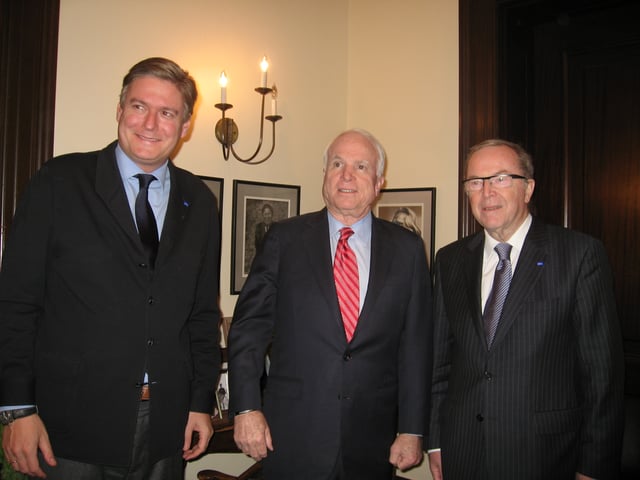
From left to right: López-Istúriz, McCain & Martens
The EPP is also present and active in the Parliamentary Assembly of the North Atlantic Treaty Organization (NATO), and forms the "EPP and Associated Members" Group there. It is led by the German CDU politician Karl Lamers, who is also the current President of the Assembly. The Group also includes members of the Conservative Party of Canada and the Republican Party of the United States.
Relations with the United States
The EPP has close relations with the International Republican Institute (IRI), an organisation funded by the U.S. government specially to promote democracy and democratisation. The EPP and the IRI cooperate within the framework of the European Partnership Initiative.[26]
The EPP's late President, Wilfried Martens, endorsed Senator John McCain, the Republican nominee for president, in the presidential election in 2008[27] McCain is also Chairman of the IRI. In 2011 Martens and McCain made joint press statements expressing their concern about the state of democracy in Ukraine.[28][29]
Global networks
The EPP is the European wing of two global centre-right organisations, the International Democrat Union (IDU) and the Christian Democrat International (CDI).
Wilfried Martens Centre for European Studies
Following the revision in 2007 of the EU Regulation that governs European political parties, allowing the creation of European foundations affiliated to Europarties, the EPP established in the same year its official foundation/think tank, the Centre for European Studies (CES). The CES includes as members all the major national think tanks and foundations affiliated to EPP member parties: the Konrad Adenauer Foundation (CDU), the Hanns Seidel Foundation (CSU), the Foundation for Analysis and Social Studies (PP), the Constantinos Karamanlis Institute for Democracy (ND), the Jarl Hjalmarson Foundation (MOD), the Political Academy of the Austrian People's Party (ÖVP) and others. During the European Parliament election campaign in 2009 the CES launched a web-based campaign module, tellbarroso.eu, to support Jose Manuel Barroso, the EPP's candidate for re-election as Commission President.
In 2014, to honour Wilfried Martens - the late President of the EPP who was also President of the CES - the CES changed its name to Wilfried Martens Centre for European Studies or Martens Centre.
The current President of the Martens Centre is former Slovak Prime Minister Mikuláš Dzurinda.
The Budapest-based Robert Schuman Institute and the Luxembourg-based Robert Schuman Foundation are also affiliated with the European People's Party.
EPP associations
The EPP is linked to several specific associations that focus on specific groups and organise seminars, forums, publications and other activities.
Small and Medium Entrepreneurs Europe (SME Europe)
SME Europe is the official business organisation of the EPP, and serves as a network for pro-business politicians and political organisations. Its main objective is to shape EU policy in a more SME-friendly way in close cooperation with the SME Circle of the EPP Group in the European Parliament, the DG Enterprise and the pro-business organisations of the EPP's member parties. Its top priorities are to reform the legal framework for SMEs all over Europe, and to promote and support the interests of small and medium-sized enterprises. SME Europe was founded in May 2012 by three Members of the European Parliament, Paul Rübig, Nadezhda Neynsky and Bendt Bendtsen.
European Democrat Students
European Democrat Students (EDS) is now the official students’ organisation of the EPP, though it was founded in 1961, 15 years before the EPP itself. Led by Virgilio Falco, EDS has 40 member organisations, representing nearly 1,600,000 students and young people[30] in 31 countries, including Belarus and Georgia. Every year EDS hosts Summer and Winter "universities", and several seminars. It also regularly publishes a magazine, Bullseye, and organises topical campaigns.
European Senior Union
Founded in Madrid in 1995 and led by Ann Hermans of the CD&V, the European Senior Union (ESU) is the largest political senior citizens’ organisation in Europe. The ESCU is represented in 26 states with 45 organisations and about 500,000 members.
European Union of Christian Democratic Workers
The European Union of Christian Democratic Workers (EUCDW) is the labour organisation of the EPP, with 24 member organisations in 18 different countries. As the officially recognised EPP association of workers, the EUCDW is led by Elmar Brok, MEP. It aims at the political unification of a democratic Europe, the development of the EPP on the basis of Christian social teaching, and the defence of workers' interests in European policy-making.
Women of the European People’s Party
The Women of the European People’s Party (EPP Women) is recognised by the EPP as the official association of women from all like-minded political parties of Europe. EPP Women has more than 40 member organisations from countries of the European Union and beyond. All of them are women‘s organisations of political parties that are members of the EPP. EPP Women is led by Doris Pack.
Youth of the European People’s Party
The Youth of the European People’s Party (YEPP), led by Lídia Pereira, is the EPP‘s official youth organisation. It has 64 member organisations, bringing together between one and two million young people in 40 countries.
Membership
Within the EPP there are three kinds of member organisations: full members, associate members and observers. Full members are parties from EU states. They have absolute rights to vote in all the EPP's organs and on all matters. Associate members have the same voting rights as full members except for matters concerning the EU's structure or policies. These associate membres are parties from EU candidate countries and EFTA countries. Observer parties can participate in all the activities of the EPP, and attend the Congresses and Political Assemblies, but they do not have any voting rights.
A special status of "supporting member" is granted by the Presidency to individuals and associations. Although they do not have voting rights, they can be invited by the President to attend meetings of certain organs of the party. Three EU Commissioners, Dacian Cioloș, Kristalina Georgieva and Andris Piebalgs, are members of the EPP even though they do not belong to any national member party.
Full member parties
| Country | Party name | Abbr. | Legislature lower house seats | Legislature upper house Seats | Status |
|---|---|---|---|---|---|
| Austrian People's Party Österreichische Volkspartei | ÖVP | 61 / 183 | 22 / 61 | Technical Government | |
| Christian Democratic and Flemish Christen-Democratisch en Vlaams | CD&V | 18 / 150 | 8 / 60 | Government | |
| Humanist Democratic Centre Centre démocrate humaniste | cdH | 9 / 150 | 4 / 60 | Opposition | |
| Citizens for the European Development of Bulgaria Граждани за европейско развитие на България Grazhdani za evropeĭsko razvitie na Bŭlgariya | GERB | 95 / 240 | Government | ||
| Democrats for a Strong Bulgaria Демократи за силна България Demokrati za silna Bălgarija | DSB | 0 / 240 | No Status | ||
| Union of Democratic Forces Съюз на демократичните сили Sayuz na demokratichnite sili | SDS | 0 / 240 | No Status | ||
| Democratic Party Демократическа партия Demokraticheska partia | DP | 0 / 240 | No Status | ||
| Movement "Bulgaria of the Citizens" Движение „България на гражданите“ Dvizhenie „Bulgariya na grazhdanite“ | BCM | 0 / 240 | No Status | ||
| Croatian Democratic Union Hrvatska demokratska zajednica | HDZ | 55 / 151 | Government | ||
| Democratic Rally Δημοκρατικός Συναγερμός Dimokratikós Sinagermós | DISY | 18 / 56 | Government | ||
| Christian and Democratic Union – Czechoslovak People's Party Křesťanská a demokratická unie – Československá strana lidová | KDU–ČSL | 10 / 200 | 16 / 81 | Opposition | |
| TOP 09 | 7 / 200 | 2 / 81 | Opposition | ||
| Conservative People's Party Det Konservative Folkeparti | C | 6 / 179 | Government | ||
| Christian Democrats Kristendemokraterne | KD | 0 / 179 | No Status | ||
| Pro Patria Isamaa | I | 12 / 101 | Government | ||
| National Coalition Party Kansallinen Kokoomus Samlingspartiet | KOK | 38 / 200 | Government | ||
| The Republicans Les Républicains | LR | 112 / 577 | 144 / 348 | Opposition | |
| Christian Democratic Union Christlich Demokratische Union Deutschlands | CDU | 200 / 709 | Government | ||
| Christian Social Union in Bavaria Christlich-Soziale Union in Bayern | CSU | 46 / 709 | Government | ||
| New Democracy Νέα Δημοκρατία Nea Dimokratia | ND | 158 / 300 | Government | ||
| Christian Democratic People's Party Kereszténydemokrata Néppárt | KDNP | 16 / 199 | Government | ||
| Fine Gael | 50 / 158 | 19 / 60 | Government | ||
| Forza Italia | FI | 104 / 630 | 61 / 315 | Opposition | |
| Popular Alternative Alternativa Popolare | AP | 2 / 630 | 1 / 315 | Opposition | |
| Union of the Centre Unione di Centro | UdC | 0 / 630 | 3 / 315 | Opposition | |
| Populars for Italy Popolari per l'Italia | PpI | 0 / 630 | 0 / 315 | No Status | |
| New Unity Vienotība | JV | 8 / 100 | Government | ||
| Homeland Union – Lithuanian Christian Democrats Tėvynės sąjunga – Lietuvos krikščionys demokratai | TS-LKD | 31 / 141 | Opposition | ||
| Christian Social People's Party Chrëschtlech Sozial Vollekspartei Parti populaire chrétien social Christlich Soziale Volkspartei | CSV/PSC | 23 / 60 | Opposition | ||
| Nationalist Party Partit Nazzjonalista | 28 / 67 | Opposition | |||
| Christian Democratic Appeal Christen-Democratisch Appèl | CDA | 19 / 150 | 12 / 75 | Government | |
| Civic Platform Platforma Obywatelska | PO | 136 / 460 | 33 / 100 | Opposition | |
| Polish People's Party Polskie Stronnictwo Ludowe | PSL | 15 / 460 | 0 / 100 | Opposition | |
| Social Democratic Party Partido Social Democrata | PSD | 89 / 230 | Opposition | ||
| Democratic and Social Centre - People's Party Centro Democrático e Social – Partido Popular | CDS-PP | 18 / 230 | Opposition | ||
| National Liberal Party Partidul Național Liberal | PNL | 69 / 329 | 30 / 136 | Opposition | |
| Democratic Alliance of Hungarians in Romania Romániai Magyar Demokrata Szövetség Uniunea Democrată Maghiară din România | UDMR | 21 / 329 | 9 / 136 | Opposition (Government Support) | |
| People's Movement Party Partidul Mișcarea Populară | PMP | 18 / 329 | 8 / 136 | Opposition | |
| Christian Democratic Movement Kresťanskodemokratické hnutie | KDH | 0 / 150 | No Status | ||
| Most–Híd | 15 / 150 | Government | |||
| Party of the Hungarian Community Magyar Közösség Pártja Strana maďarskej komunity | SMK/MKP | 0 / 150 | No Status | ||
| Slovenian Democratic Party Slovenska demokratska stranka | SDS | 25 / 90 | Opposition | ||
| Slovenian People's Party Slovenska ljudska stranka | SLS | 0 / 90 | No Status | ||
| New Slovenia–Christian Democrats Nova Slovenija – Krščanski demokrati | NSi | 7 / 90 | Opposition | ||
| People's Party Partido Popular | PP | 66 / 350 | 74 / 266 | Opposition | |
| Moderate Party Moderata samlingspartiet | M | 70 / 349 | Opposition | ||
| Christian Democrats Kristdemokraterna | KD | 22 / 349 | Opposition | ||
Associate members
Albania
Democratic Party of Albania (PDSh)
North Macedonia
Internal Macedonian Revolutionary Organization – Democratic Party for Macedonian National Unity (VMRO–DPMNE)
Conservative Party (H)
Serbia
Serbian Progressive Party (SNS)
Alliance of Vojvodina Hungarians (VMSZ/SVM)
Switzerland
Christian Democratic People's Party (CVP)
Observer members
Armenia
Republican Party of Armenia (HHK)
Rule of Law (OEK)
Heritage
Belarus
Belarusian Christian Democracy (BCD)
United Civic Party of Belarus (AHP)
The Movement for Freedom (MFF) [32]
Party of Democratic Action (SDA)
Croatian Democratic Union of Bosnia and Herzegovina (HDZBiH)
Party of Democratic Progress (PDP)
Croatian Democratic Union 1990 (HDZ 1990)
Finland
Christian Democrats (KD)
Georgia
United National Movement (UNM)
European Georgia
South Tyrolean People's Party (SVP)
Trentino Tyrolean Autonomist Party
Kosovo
Democratic League of Kosovo (LDK)
Liberal Democratic Party of Moldova (PLDM)
Dignity and Truth Platform Party (PPDA)
Party of Action and Solidarity (PAS)
Christian People's Party (KrF)
Sammarinese Christian Democratic Party (PDCS)
Ukraine
Former members
Belarus
Belarusian Popular Front (BNF), observer member until 2017
Croatia
Croatian Peasant Party (HSS), member until withdrawal May 2019.
Romania
Democratic Party (PD)
Democratic Liberal Party (PDL)
Christian Democratic National Peasants' Party (PNȚ-CD)
Slovak Democratic and Christian Union – Democratic Party (SDKÚ-DS)
Spain
Turkey
Justice and Development Party (observer)
Ukraine
People's Movement of Ukraine (observer)
Our Ukraine (observer)


